Politics
Polls – grim prognoses for Labor, grimmer prospects for Australia
We can ignore the Murdoch tropes about the Albanese government being the worst since Federation. That’s standard fare. But when Bernard Keane writes in Crikey, that a stubborn Albanese goes quietly to his – and Labor’s – defeat, we should pay attention. Australia runs the risk of handing government over to Peter Dutton, whose idea of getting Australia “back on track” is to see us slowly go down the populist path Argentina and other once-prosperous south American countries took last century. As Keane writes:
Peter Dutton leads a pack of duds, and his policies — where he has them — are an embarrassing confection of innumeracy and MAGA Down Under cut-and-pastes. Labor should be setting itself up for an extended period in government. Instead, Anthony Albanese is quietly leading it to defeat.
To put it simply, in 2022 enough Australians voted for a Labor government because they wanted something better than business-as-usual. But what they got was more business-as-usual, with some worthwhile but timid economic tweaks to the prevailing neoliberal model.
But the Albanese government let Dutton set the agenda – on integrity, on electoral funding, on gambling and on reactions to anti-Semitism. It’s almost as if Albanese, obsessed with “bipartisan deals” has been keeping the seat warm for Dutton to take his rightful place.
What the numbers show
Perhaps Keane is trying to shock Albanese into behaving like a Labor prime minister, but there is no doubt that support for Labor has weakened over the December-January period, and that support for the Coalition has strengthened. The table below, compiled from William Bowe’s Poll Bludger figures, shows that in comparison with the 2022 election, Labor support is down by about two percent, while Coalition support is up by about four percent.
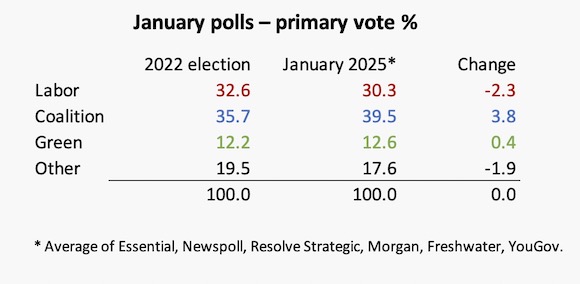
This is about a one percent deterioration in Labor’s position since late last year. William Bowe correctly describes it as “an ongoing slow downward trend for Labor”.
There has been a similar shift in the two-party-preferred outcome, which has slowly shifted from a small lead for Labor (around 51:49) to around a similar lead for the Coalition. There has also been a weakening in Albanese’s approval and his lead as preferred prime minister, with some polls putting Dutton ahead as preferred prime minister.
Although a headline-writer for The Age says Albanese’s popularity has “plummeted” (the actual article by Natassia Chrysanthos is more cautiously written), Essential’s time series on approval suggests that Albanese’s popularity (respondents’ net “approve” minus “disapprove”), after the usual honeymoon-disillusion cycle, has been in fairly stable negative territory minus 5 percent to minus 7 percent since late 2023, while Dutton’s has a steady zero net popularity.
Drawing inferences from these numbers about election outcomes is difficult. It is possible that some of the Coalition’s gain in support results from Dutton’s pitch to the far right, helping it pick up voters who might have voted for One Nation or Palmer’s UAP.
We don’t know how the 14 independents in the House of Representatives will fare, or if other independents will break through to take seats off the Coalition or even off Labor. Opinion polls are bad at estimating support for small parties: that’s a mathematical constraint. Also, when it comes to independents there are particular difficulties, because the “teal” independents run strong campaigns in selected seats. Climate 200 is reported to be targeting up to 30 seats, and a new movement Regional Voices has emerged, backing community-based independents in selected non-metropolitan electorates. A 20 percent support for independents in 15 key seats would show up as only 2 percent in a poll across 151 electorates. On the other hand there is evidence from state elections that the Green vote, while it is unchanged nationally, may be spread more thinly, putting some of its 2022 gains in doubt.
With only 55 seats the Coalition would have to pick up around 20 seats to form a majority government: it’s a hard task. Anyone looking at those figures, and at the possibility of the government clawing back support in the campaign, would rate the Coalition’s chances poorly.
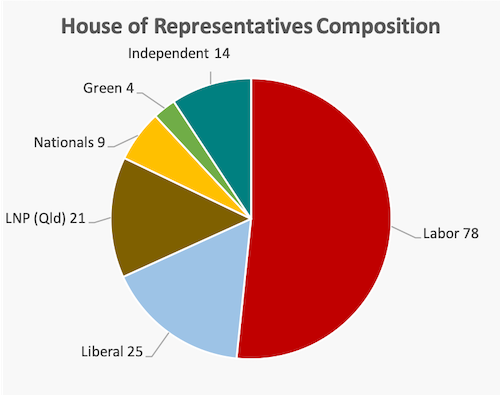
What the voters and political pundits believe: it’s complicated
The most recent Newspoll, reported on William Bowe’s site, shows that most electors expect that the outcome of the election will be a minority government. The expectations are:
- Labor majority – 15 percent;
- Labor minority – 33 percent;
- Coalition minority – 29 percent;
- Coalition majority – 24 percent
The general view among political commentators is that Dutton’s adoption of Trumpist populism, avoiding policy issues while focussing on identity and culture – will help the Coalition pick up seats in outer-suburban regions, particularly in New South Wales and Victoria.
But that same move to the far right will make it hard for the Coalition to win back seats lost to “teals” and other independents, even though two of these electorates, Curtin in Perth (Kate Chaney) and Fowler in western Sydney (Dai Le), are held on margins of less than 3 percent. The other general view is that the Coalition will surely do better in Victoria than it did in 2022, where its primary vote suffered a 6 percent swing, bringing it down to to 33 percent. The main hurdle for the Coalition, however, is that there are only 7 Labor-held seats with margins of less than 3 percent.
These general views are described in detail by Rick Morton on a Schwartz media 7am podcast titled Peter Dutton’s plan to win back teal seats. He describes how an outfit called “Australians for prosperity”, funded by the coal lobby, is campaigning hard against independents. He also discusses particular issues around the Bradfield electorate in northern Sydney, where issues of hard-right versus moderate conflicts in the Coalition are being played out. The Coalition’s best chance in the upcoming general election is to avoid scrutiny on policy.
One who believes Dutton has a chance of picking up enough seats to win government is Crispin Hull: numbers stack up for Dutton’s hard right push.
He is going for the seats with fewer tertiary-educated voters where almost the totality of people’s concerns is the economic well-being of themselves and their immediately family – encapsulated in the phrase “cost of living”.
Hull shows how a 6 percent swing in these electorates could deliver a majority result for the Coalition.
The changing political landscape
One largely unchallenged assumption is that the Coalition will hold all its present non-metropolitan seats. But, as the ABC’s Jane Norman reports, community independents are targeting key marginal seats in non-metropolitan regions, including Cowper (north coast New South Wales), and Wannon (western Victoria, held by Dan Tehan – one of Dutton’s most faithful servants).
In fact the lazy classification “regional” – a term used by journalists to describe everything outside capital city boundaries (and which ignores regions within cities) – overlooks the increasingly complex settlement pattern in Australia. Community independents are well-established in Indi (around Wangaratta and Wodonga) and Mayo (Adelaide hills and Kangaroo Island). In 2022 the independent candidate Rob Priestly came close to knocking off the Nationals in their once “safe” electorate of Nicholls, centred on Shepparton, which is picking up new electors along the Hume Freeway.
Kathy McGowan, considered the pioneer of the community independents movement, on a Schwartz Media’s 7am podcast, describes how to run a community independent campaign. The community independents’ strength lies largely in their candidates not being bound by the stifling rules and conventions of the main parties, and their being able to take on board community issues. They listen, rather than sell a party line. Of course the two old main parties warn about the danger of minority government, but as she points out:
… if you're negotiating with someone who actually represents their community, they are going to negotiate from a much, much tougher position than someone who just represents a party and they're safe in their job because they've got party endorsement. So I actually like the idea where the numbers are a lot closer where the majority has to actually work with the crossbench to get better legislation. I just absolutely think it's in our national interest.
The other trend, in plain sight, but largely ignored by the commentariat, is demographic, as pointed out by Patricia Karvelas in her post Federal election 2025 will be the first vote where Gen Z and Millennials outnumber Baby Boomers at the ballot box. Every election there are fewer “baby boomers”, largely rusted-on Coalition supporters who kick up a fuss every time there is the slightest hint that they should pay their fair share of taxation. They are slowly being replaced by younger voters, concerned with housing affordability and student debt. Many will turn to parties and candidates offering relief on these issues, but there are also young men who missed out on education, who will be attracted to Dutton’s blokey political style.
Kos Samaras discusses this demographic transition in a 7-minute Radio National interview When in doubt, Gen Z [voters aged 18 to 30] are voting Green. The Green vote is very high among this demographic, but Samaras’ general finding is that these voters have no party loyalty, but they feel let down by the established two-party system. They have been hard done by economically, and are voting “to shake the cage up”. Independents who listen to their concerns will win their vote. Many are politically discerning and well-educated but others will be attracted to those offering simple solutions to complex problems. (It would be unsurprising if many younger voters are tossing up between Dutton’s Coalition and the Greens. This is the sort of populist politics emerging in countries like Germany, where “far right” and “far left” parties are converging around populist platforms.)
These numbers do not suggest that the government is in dire trouble. But as Keane points out, there is no sign that between now and the election the drift will stop. The story now circulating is of a government heading to defeat – a story that has its own positive feedback mechanism. It’s reinforced by journalists, including ABC journalists, who slip into talking about a “cost of living crisis”, amplifying Dutton’s Trumpian line “are you as well off now as you were three years ago”, ignoring the deep-seated structural weaknesses in the economy. And it is amplified by journalists who, either because of ignorance or a concern for “balance”, refuse to challenge Dutton and the duds on his front bench on economics and who fail to call out his hypocrisy
Beware of the strong “leader”
The best lack all conviction, while the worst are full of passionate intensity – W B Yeats
“Donald Trump is exactly the kind of dedicated, strong, decisive, brave and unapologetic leader America desperately needs, his impact will be felt around the world” said Gina Rinehart, in an interview with Australian journalist Heath Parkes-Hupton. It is the time for “leadership with courage”, she quotes from her own opinion provided to The Australian.
“Voters want strong leadership” is the headline of an editorial in The Australian of 27 January, which goes on to praise Dutton for his bold economic proposals.
Dutton freely presents himself as a decisive “black-and-white” thinker, with very little room for shades of grey, as reported by Paul Sakkal of The Age – Playing hard or being ‘reckless’? Dutton ramps up attack.
Albanese, by contrast, is weak and indecisive, according to this notion of leadership.
This narrative around leadership is explicable: when people feel distressed and uncertain, they seek the assurance of a strong “leader” – one who can offer simple solutions to complex problems. It’s a desire for an authority figure, even if the person exercising that authority is harsh and cruel.
Ron Heifetz, professor of leadership at the Kennedy School of Government, reminds his students how the demand for a strong “leader” is so entrenched in our way of thinking. He referrs to the story of Samuel, who tried to warn the people of Israel not to seek a strong “leader”. To quote from 1 Samuel 8, (King James):
11 And he said, This will be the manner of the king that shall reign over you: He will take your sons, and appoint them for himself, for his chariots, and to be his horsemen; and some shall run before his chariots.
12 And he will appoint him captains over thousands, and captains over fifties; and will set them to ear his ground, and to reap his harvest, and to make his instruments of war, and instruments of his chariots.
13 And he will take your daughters to be confectionaries, and to be cooks, and to be bakers.
14 And he will take your fields, and your vineyards, and your olive yards, even the best of them, and give them to his servants.
15 And he will take the tenth of your seed, and of your vineyards, and give to his officers, and to his servants.
16 And he will take your menservants, and your maidservants, and your goodliest young men, and your asses, and put them to his work.
17 He will take the tenth of your sheep: and ye shall be his servants.
18 And ye shall cry out in that day because of your king which ye shall have chosen; and the Lord will not hear you in that day.
Having been warned, however, they still wanted the strong “leader”:
19 Nevertheless the people refused to obey the voice of Samuel; and they said, Nay; but we will have a king over us;
20 That we also may be like all the nations; and that our king may judge us, and go out before us, and fight our battles.
It would not have surprised Samuel to know that 3000 years later people would be voting for strong “leaders”, even if they had been warned that they would not govern wisely.
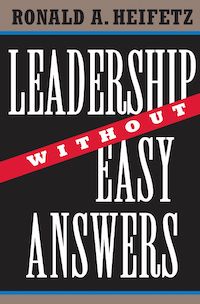
Ron Heifetz has gone on to write books on leadership: Leadership without easy answers is perhaps the most well-known. There is also a neat 8-minute video in which he describes what leadership entails.
Importantly, he writes and teaches about “leadership”, not “leaders”.
The people we commonly call “leaders” are usually the people in positions of authority – the prime minister, the CEO, the military commanding officer. They fill important roles, but it is a mistake to assume that just because they occupy positions of authority they exercise leadership.
He rejects the common “leader – follower” model. Rather he defines leadership as the work of mobilizing people’s resources to make progress on dealing with difficult problems. It is hard work, and can be exercised from any position.
There are rarely easy answers to difficult problems requiring what Heifetz calls “adaptive work”. That is the work of dealing with difficult trade-offs, which may require people to change their beliefs and practices, to make immediate sacrifices to achieve longer-term benefits, and to accept that some problems have no solution at all. Dealing with climate change, raising taxes to continue to provide public services, reconciling with aboriginal people, dealing with challenges of youth crime, are all examples of difficult problems without easy solutions. To make progress, there is a lot of adaptive work to do. That work has to be done by the whole community: it cannot be left to the “leader”.
The work of leadership, particularly the task of getting issues on to the agenda, often takes place behind the scenes. In a democracy it is often the back-bencher, or the independent member of a Parliamentary committee, who can raise hard issues that ministers cannot. Retired ministers and senior public servants, if they have a voice, can raise hard issues, as Paul Keating does on foreign affairs, as Ken Henry does on tax and Abul Rizvi does on immigration.
That is not to say prime ministers, opposition leaders (“bosses” would be a better term) and cabinet ministers cannot raise hard issues and exercise leadership, but they usually have administrative or political constraints limiting their flexibility. And when they try to bring about change they have to be careful with pacing. If people feel they are pushed too quickly, they will reject the “leader”, as they did when Hewson put his Fightbackagenda to the people in 1993). But rejection will also occur if people believe the “leader” is weak and indecisive, and is being too slow and cautious.
If Albanese and his team have erred, it’s probably on that side: Labor is still haunted by scare campaigns of times past when it put bold agendas to voters.
Laura Tingle describes the contrast between Albanese’s and Dutton’s approach to public policy on Late Night Live: the shadow campaign is in full swing. (10 minutes). Albanese’s caution, his low-key polite manner, and his concern for process, comes across as dullness, and even a fear of criticism. Dutton, using simple categorical (but generally empty) statements gives the impression that he is decisive, because he knows the answers. His manner is often insensitive and blunt, but many of his followers see that as an asset.
Dutton knows that when people are fearful and uncertain they seek the assurance of a strong “leader”. Even if people know that a Coalition government would burden the country with expensive and unnecessary nuclear power plants, make health and education more expensive, and enrich plutocrats while suppressing wages, they still see the attraction of a decisive “leader”.
Recognizing the risk of attention to process being mistaken for weakness, Theeodore Roosevelt said “speak softly and carry a big stick”. Perhaps Albanese needs to wield a big stick on minor matters to show that he has chosen his style deliberately, rather than because of fear or uncertainty. For example, with crossbench support, he could land a serious blow on the gambling industry: the negative reaction from affected interests could even be turned to his interests. Or his government could abolish one of the tax breaks for the well-off that accumulated on the Coalition’s watch, listed in Treasury’s Tax Expenditure and Insights Statement, released in December: the squeals from the underserving could be an electoral asset.
Anti-Semitism – the Coalition incites division
On Monday night, speaking from Kraków before attending a Holocaust memorial at Auschwitz, Attorney General Mark Dreyfus, descended from a great-grandmother murdered at Auschwitz, said all that needs to be said about anti-Semitism in Australia:
It’s been grotesque to see the rise in anti-Semitism since October the 7th, but it’s been equally grotesque to see attempts being made to politicize either commemoration of the Holocaust or combatting anti-Semitism.
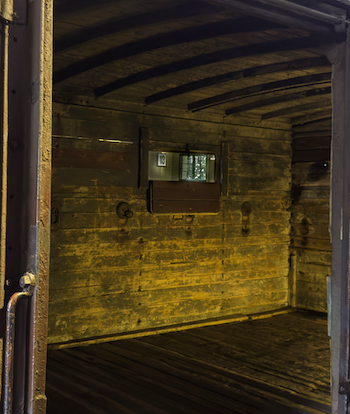
Rail carriage that carried Jews to Auschwitz
But just ten minutes later Senator James Paterson, newly appointed by Dutton as the Coalition’s spokesperson on home affairs, was on the ABC’s 730 program, blaming the Albanese government for “the anti-Semitism crisis and now domestic terrorism crisis”. (This was in the context of a string of false claims about the government failing on border security).
Repeatedly, in the context of the Auschwitz visit, Dutton has claimed that the Albanese government has been soft on anti-Semitism and that Penny Wong is not a suitable person to represent Australia at the commemoration, basing that assertion on Australia’s votes at the United Nations. He wants us to believe that Australia went out on a limb at the UN to vote against Israel, when in fact Australia’s votes at the UN have been in line with most western countries, including Germany – a country with particular sensitivities in its relationship with Israel.
Notably the United Kingdom, a country that has voted the same way as Australia, was represented at Auschwitz by that country’s King Charles. Was King Charles, by Dutton’s perverse reasoning, an unsuitable person to represent his country? Did the UK opposition leader, Kemi Badenoch, use the Auschwitz commemoration as an opportunity to take a cheap shot at the Labour government?
On Tuesday morning South Australian Premier Peter Malinauskas, commenting on a Nazi demonstration that had been held in Adelaide, called for a more civilized way to engage in political discourse. “The overwhelming majority of Australians do that very thoughtfully and peacefully and in a considered way, and it’s incumbent on us to express a desire of everyone else in the community that that is a standard that is upheld.”
We should not commemorate the Holocaust by shouting accusations from the rooftops. Anyone who visits the concentration camps and other Holocaust memorials in Europe will have experienced a dignified, sacred, silence. Hopefully that atmosphere can be created in the planned Holocaust Education Center in Canberra. And hopefully, if Australian school children learn about the Holocaust and other cases of genocide, they will come to understand the threats posed by right-wing populism.
Separating the issues
In many countries, as support for far-right parties has risen, anti-Semitism has risen, and it has risen more strongly since the October 7 attacks. Australia, unfortunately, has not been immune. But the domestic reaction to the events in the Middle East have a particularly nasty flavour in Australia, in the way that criticisms of Israel’s government and expressions of sympathy for the Palestinian people have become conflated with anti-Semitism and with claims that Israel has no right to exist or to defend itself.
On The ABC’s God Forbid program – The world's oldest hatred: how anti-Semitism found its way to Australia – you can hear three well-informed people discuss this problem of conflation of issues, and other complex issues around anti-Semitism. They are:
Peter Wertheim, co-CEO of the Executive Council of Australian Jewry, the peak national body representing Australia’s Jewish community;
Rachel Shabi, writer for The Guardian UK, born in Israel to Arab Iraqi Jewish parents. She is author of Off white: the truth about anti-Semitism;
Peter Beinart, Professor at the City University of New York School of Journalism, who describes himself as an orthodox Jew. He is author of Being Jewish after the destruction of Gaza.

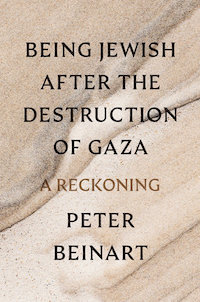
The discussion covers a great deal of ground, mainly around the need to separate the issues around anti-Semitism. One observation in that regard is the situation in Hungary, where the Orbán government shows strong political support for the Netanyahu government, while pursuing anti-Semitic policies domestically.
You can also hear Beinart on Late Night Live (34 minutes), providing context around the October 7 atrocities. He also notes the way Jewish people in western countries have retreated from their once-prominent commitment to liberalism. And he raises the difficult issues – difficult for Israelis and Australians alike – around settlers occupying land that belongs to others.
The suggestion that anti-Semitism is some new phenomenon in Australia – somehow connected to our election of a Labor government – is partisan rubbish. Two Conversation contributions, one from 2023, and one this month, cover the history of anti-Semitism in Australia:
The long, dark history of antisemitism in Australia by Suzanne Rutland of the University of Sydney;
80 years after the liberation of Auschwitz, amid rising antisemitism, the memory of the Holocaust remains contentious, by Jan Lanicek of the University of New South Wales and Avril Alba of the University of Sydney.
We have much to celebrate. For example after 1945 Australia accepted the second largest number of Holocaust survivors per capita after the state of Israel. Until recently the wall of the Jewish Museum in Berlin was covered with a massive picture of a refugee boat arriving in Sydney Harbour. But we also have our dark moments, and they are associated with the entire “left-right” political spectrum.
One pattern that stands out is that those engaged in anti-Semitism are also engaged in attacks against other ethnic or “racial” minorities and against homosexuals. White supremacists and other authoritarian right movements feature strongly in these histories, and it’s unsurprising that the Nazi movement (a tiny but noisy movement) has made a reappearance at this time. We should keep in mind that over the last twenty years the Coalition, through preference deals, has been accommodating to the far-right racist fringe, giving it a certain legitimacy. Right-wing extremists share with Coalition parties a strong attachment to certain symbols: Nazi demonstrations are marked not only by masks and black uniforms, but also by prominent displays of the flag.
Calling out Dutton
Marcia Langton is one of the few Australians with a public voice to have drawn attention to the hypocrisy in Dutton’s approach to anti-Semitism. In her Saturday Paper article – Peter Dutton’s deliberate Australia Day cruelty – she writes:
It’s a bad time to be non-white in Australia. Speaking out of both sides of his mouth, Peter Dutton has demanded an end to anti-Semitism and, at the same time, incited hatred of Aboriginal people, not just exploiting the anti-Voice surge of racism but inciting further racism against us. I agree that anti-Semitism is a scourge and must be tackled with tough laws and policing. So, too, are all forms of racism and xenophobia, particularly the rising levels of race hate against Aboriginal people, Muslims and other ethnicities, many of which have been singled out by Dutton.
Langton’s clear assignment of responsibility contrasts with the “on-the-one-hand-on-the-other-hand” moral relativism revealed in so much journalism around anti-Semitism, exemplified by Michelle Grattan’s Conversation contribution: Whatever the government does, Albanese struggles to strike the right note in antisemitism battle.
The ABC, for its part, uses passive-voice statements, such as “anti-Semitism has been politicized”. They know who is making the issue one of partisan politics, because they give airtime to Dutton when he falsely accuses the government of going soft on anti-Semitism. It’s cowardly of the national broadcaster not to state clearly who is raising the political temperature and trying to set Australian against Australian.
And it’s surely irresponsible for the ABC to give airtime to Dutton’s incitements to hatred. It wouldn’t give airtime to Nazis, white supremacists, or spokespeople for Hamas. If it wants the views of politicians who will criticize the government, there are plenty of independents and crossbenchers who can call the government to account in a civilized manner.
There are voices suggesting that anti-Semitism is a crime so abhorrent that it should have its own category in the criminal code books. But have those making such a call thought that idea through? The Europe in which Nazism and Fascism arose had a long history of special laws, generally discriminatory, relating to Jews. Established Jewish exceptionalism was not only the basis on which the Hitler government could impose even harsher laws relating to Jews, but it also allowed Jews to be seen as somehow separate from other people.
While Australians may reasonably see a case for special laws relating to the original owners of the land, there is little appetite for singling out one of the many groups who have come to this country fleeing persecution and discrimination. That would go right against our commitment to secularism and multiculturalism.
If there is a political message to be made around anti-Semitism, it can be done so in a way that calms, rather than inflames, the national mood, and that stimulates thought rather than inciting partisan hatred. Such a message is in the Saturday Paper editorial Beneath the soil of history. Anti-Semitism is political – intensely political as European history shows – but it should not be the matter of partisan politics.